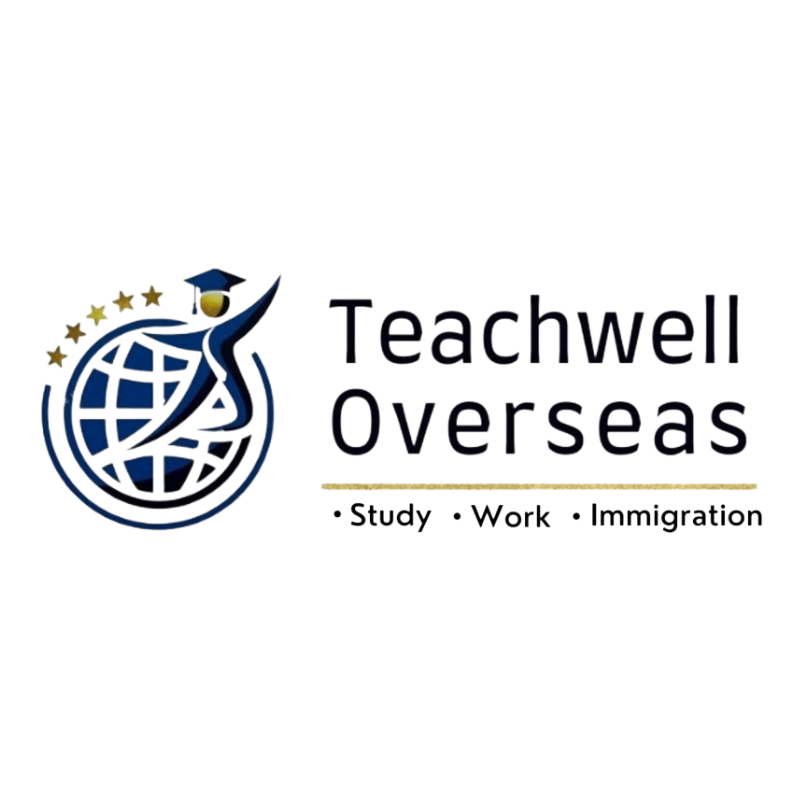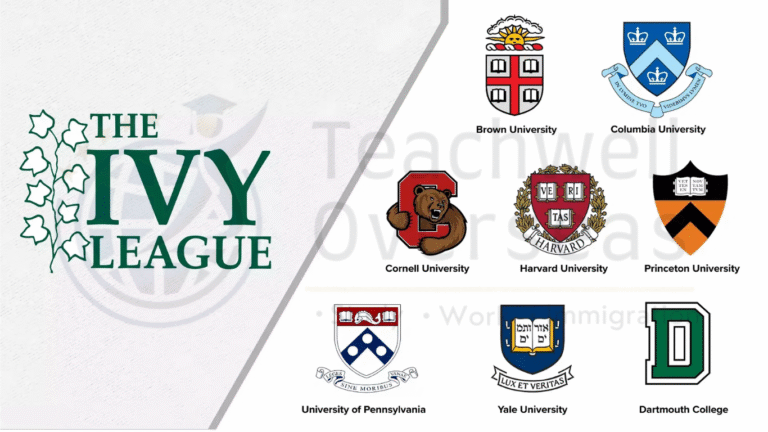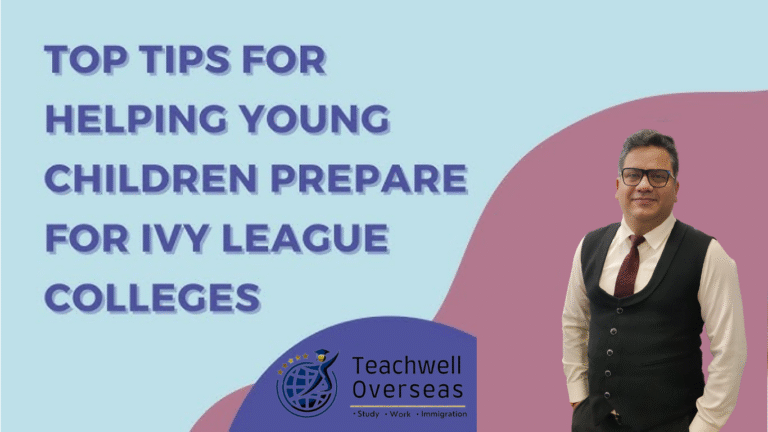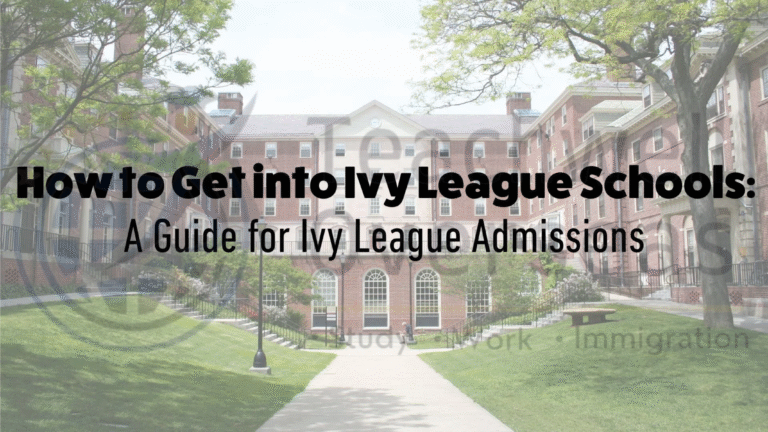Study Abroad Consultants In Delhi
- support@teachwell.co.in
- +91 93103 80899
- support@teachwell.co.in
- +91 93103 80899

How to Apply to Ivy League Universities - A Student's roadmap from Start to Finish.

For aspiring students around the world, the dream of getting accepted into an Ivy League University is a powerful aspiration. The Ivy League schools include: Harvard, Yale, Princeton, Columbia, Brown, Dartmouth, Cornell, and the University of Pennsylvania – these schools share a legacy of academic achievement, excellence, prestige and opportunities well beyond the United States. The Ivy League provides more students than any other universities the possibility of gaining admission. But acceptance into these highly competitive schools has become one of the most competitive and complicated to navigate from strong grades to a well developed personal narrative that help to develop and complete a student’s application that is a reflection of a well rounded application. From preparation to submission, this road map will provide the direction for each step on the journey of applying to an Ivy League University and give you, as the student, an understanding of how to differentiate yourself from your fellow applicants.
Step 1: Understanding Ivy League Universities and Their Admission Criteria
Before you start the application process, it is important to know what differentiates Ivy League Universities from other institutions. They want students who not only excel in academics but who have leadership and responsibilities outside of class and show intellectual curiosity and determination in their courses.
Here are some of the things Ivy League Universities will be considering:
• Academic achievements (GPA, class rank)
• Standardized test scores (e.g. SAT/ACT, TOEFL/IELTS for international applicants)
• Depth of involvement and leadership in extracurricular activities
• Writer’s personal essays and the letters of recommendation
• Anything about you that differentiates you and makes you an achiever or a unique talent
Step 2: Academic Preparation for Ivy League Universities

Your academic performance is the backbone of your application. When you are interested in Ivy League institutions, there is no doubt that you should be striving for academic excellence.
• Aim for a GPA that is greater than 3.8 on a 4.0 scale.
• Take challenging courses like AP and IB, or advanced and honors classes!
• Take advanced level courses in areas aligned with your intended area of study.
• Participate in academic enrichment programs, certifications and summer schools to enhance your resume.
• Obtain a mentor or tutor in challenging subjects so that you do not have any interesting weaknesses from high school on your transcript.
• Use academic journals, research projects, competitions etc., to build your intellectual foundation.
Having academic strength for four years of high school shows consistency and perseverance, something admissions officers will pay attention to!
Step 3: Standardized Testing Strategy
Several Ivy League Universities have “standardized tests -option and if you qualify it,these test scores can help increase your chances.” So, plan early for the SAT/ACT so that you don’t have to be rushed during the test prep state.
• You ought to do practice tests or practice, considering what mistakes you initially remove progress on.
• You also may want to prepare for TOEFL/IELTS if you are an International Student to demonstrate proficiency in English.
• A rule of thumb, you want to have a score in the 95 shelf percentile or higher.
• You may also want to consider hiring a professional coach or using an online prep course for additional structured support.
You should also look into other subject tests (IF TOU had one) or advanced certifications based on your field. In the end, just remember, while test scores alone don’t make or break an acceptance decision, test scores do help to mark you apart from other applicants who may be in a very competitive applicant pool.
Step 4: Building a Strong Extracurricular Profile
Extracurricular activities are important to express yourself outside of the classroom. Ivy Leagues want depth not breadth.
Think quality over quantity focus on 2-3 key areas where you can show you are exceptional.
• Demonstrate leadership in school clubs, organizations or student government.
• Participate in academic competitions, science fairs or research projects.
• Demonstrate passion for arts, sports or music.
• Be involved in long term community service or social impact projects.
• Establish your own initiative, non-profit, or entrepreneurial effort to demonstrate leadership and creativity.
• Have a internship, volunteering or shadow professionals in your fields of interest.
At the end of the day, you want to show dedication, enthusiasm and impact, not just surface involvement.

Step 5: Crafting a Compelling Personal Story
Crafting a personal story is your opportunity to leave a stamp, even a thumbprint.
• Take some time to think about the experiences that shaped your values, dreams, or views on the world.
• Write from a place of authenticity- admissions officers at Ivy League Universities would much rather see your genuine self than polished perfection.
• Show your resiliency, curiosity and passion for the direction you want to take.
• Draft and edit multiple drafts, and talk about them with mentors or teachers: you will improve writing each time.
• Try to avoid clichés-too many can burden you and keep you from looking at the world through your unique eyes and story.
• As an admissions officer, I will be impressed by someone who is able to demonstrate their intellectual curiosity by connecting their past experiences to future aspirations.
A personal story that shows the authenticity of a person or the growth of a person could outweigh perfect scores.
Step 6: Letters of Recommendation
Robust recommendation letters bolster your application and provide perspectives that grades cannot. Choose teachers who know you as both a student and a person.
• Ideally, you will request letters from teachers of relevant specific areas of study to your field of study.
• Give your recommenders your curriculum vitae or have all your achievements written down so they can create detailed letters.
• Your recommendations should speak to your academic abilities, leadership, and personal characteristics.
• The counselor recommendation should speak to your character and contributions and growth as a person in the school community.
Finally, explore the possibility of getting recommendation letters from mentors who are outside of school, such as workplace supervisors in your internship or leaders of community service efforts.
Discover more expert tips on studying abroad to strengthen your chances of getting into Ivy League Universities.
Step 7: Application Strategy for Ivy League Universities

Each Ivy League school has their specific requirements to satisfy. An application strategy that ramped up preparation could make a difference.
• Decide if you’ll apply Early Decision/Early Action or Regular Decision.
• Be extremely vigilant about deadlines.
• Prepare forms such as transcripts, essays, financial aid forms, and test scores.
• You may use the Common App or Coalition App but don’t forget to adjust essays to suit the culture and values of each school.
• Research faculty, programs, and extracurricular activities so you can show a university your alignment with their values.
• Stay organized with an application tracker, or spreadsheet, or digitally, to keep track of where you are with each application.
If you’re excited about your first choice, applying early could dramatically increase your chances of acceptance.
Step 8: Financial Aid and Scholarships
Ivy League tuition is expensive, but grants and scholarships make them more affordable.
• Ivy Leagues are need-blind for U.S. students and offer very generous aid packages.
• Once you are admitted the only thing you need to do for financial aid is complete the FAFSA and CSS Profile.
• If you are an international student, make sure to check the financial aid policies for each school you apply to.
• When you are accepted, locate external scholarships and grants that help lower your individual costs.
• Although Ivy Leagues don’t offer merit-based scholarships, you can also apply for merit scholarships that help with affordability.
• Regardless of what stage you are, reach out to the financial aid officers if you have any questions.
The sooner you know about your financial situation, the better you can plan and not be blindsided in the process.
Step 9: Preparing for Interviews

A number of Ivy League Universities have alumni interview components for admissions consideration.
• Go into the interview as a conversation to show your true interests and personality.
• Know that you will need to discuss academics, your outside-of-class involvement, and why you are excited to apply at the school.
• Get ready! Remain calm, confident and real.
• Review some common interview questions and do a couple of mock interviews.
• Make sure to always prepare a couple of thoughtful questions to ask the interviewer about the school.
• Talk to the interviewer about your future aspirations and how the university aligns with them.
Remember, an interview is not just about assessment it’s an opportunity to genuinely show your excitement for the university.
Learn more about admission requirements directly from the official websites of Ivy League Universities.
Step 10: Submitting and Following Up
• Before you hit submit on your application review every aspect of your application.
• Make sure your transcripts, test scores, and recommendations are all received.
• Check your email regularly for updates or requests from the admissions offices.
• Keep backup copies of anything you have submitted.
• Stay focused on academics if you receive an offer it can always be rescinded if your performance drops.
• Don’t forget to thank your recommenders and mentors who helped you along the way.
By following through with diligence, you will ensure that you are leaving no stone unturned in your application process.
Common Mistakes to Avoid When Applying to Ivy League Universities
• Missing deadlines due to procrastination.
• Submitting generic essays instead of personalized ones.
• Overloading on extracurriculars and failing to apply any depth.
• Not preparing for interviews.
• Failing to learn about each university’s individual culture, processes, and programs.
• Not considering the importance of financial aid forms.
• Overlooking mental health and wellness in the preparation process.
If you stay away from these pitfalls, you’ll be able to submit the most competitive application possible.
Tips for International Students
For students from outside the U.S., applying to Ivy League Universities may present even more complications.
• Make sure to show English proficiency through the TOEFL/IELTS.
• The application will ask you to show a global perspective, or to draw from cross-cultural life experiences.
• Demonstrate how you will contribute to the university community.
• Check the visa and financial availability requirements early.
• Engage with alumni or current students from your country so you can be in a better position to understand the transition.
• Look to see if there are workshops about cultural adaptation and/or preparatory programming.
International learners who highlight their adaptability along with a unique perspective can greatly contribute to Ivy League campuses.
Turn Your Ivy League Dream Into Reality
Conclusion:
The Ivy League University application process is an adventure that requires pre-planning, commitment, and a plan of action. There is a variety of considerations, from program research and admission requirements, to strong essay writing and interview preparation. In every piece of the process, you have the opportunity to show your true capabilities. Admission is more than grades – it’s about showing leadership, excitement, and a new lens of thinking. Taking an early start and being organized, and having the right advice will not only help you through the admission process, but it will also help you become a stronger and more durable person in any academic experience. A good admissions officer will be able to best support your journey in deciding how you want your journey through higher education to proceed.
Most admitted students have GPAs above 3.8 on a 4.0 scale, though holistic review means strong extracurriculars and essays can balance slightly lower GPAs.
Some Ivy League Universities have adopted test-optional policies, but high SAT/ACT scores can still strengthen your application.
They typically provide need-based financial aid rather than merit scholarships, ensuring affordability for admitted students regardless of family income.
Acceptance rates are usually between 3–7%, making them some of the most competitive universities in the world.
Yes, international students are welcome and often make up 10–15% of the incoming class. They should also check financial aid eligibility for non-U.S. citizens.
Far far away, behind the word mountains, far from the countries Vokalia and Consonantia, there live the blind texts. Separated they live in Bookmarksgrove right at the coast
Cornell generally has the highest acceptance rate among Ivy League Universities, though “easy” is relative as all Ivies are highly selective.